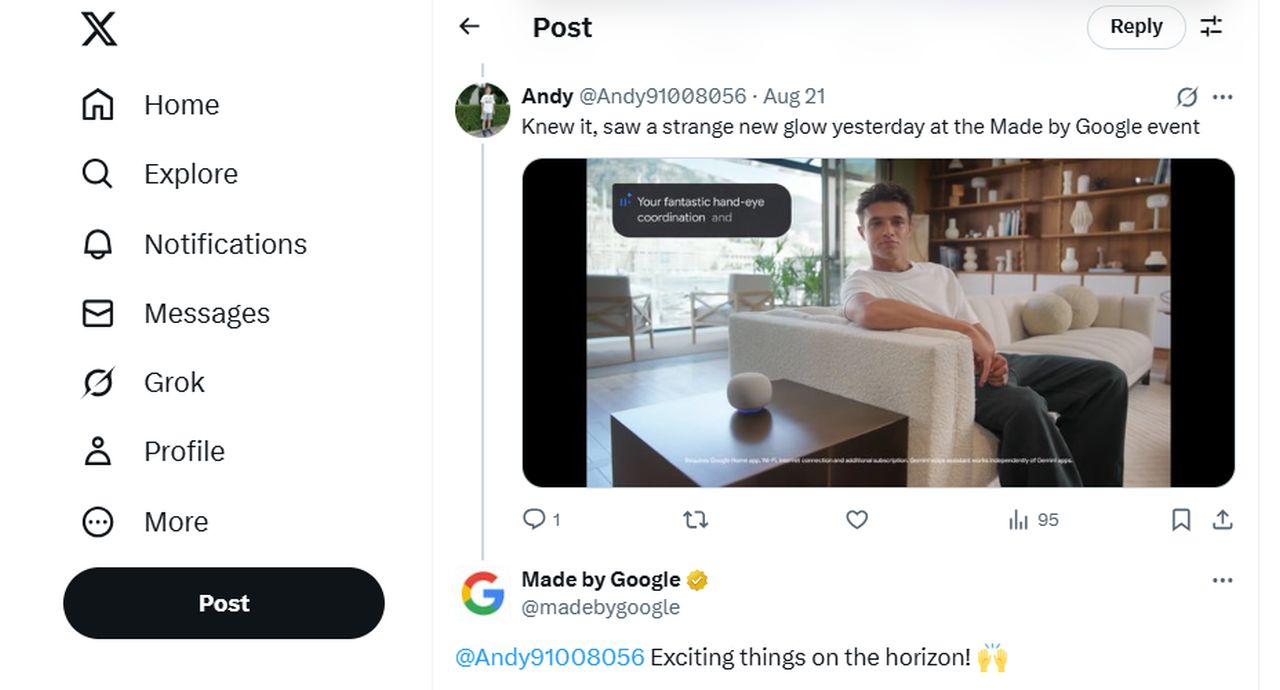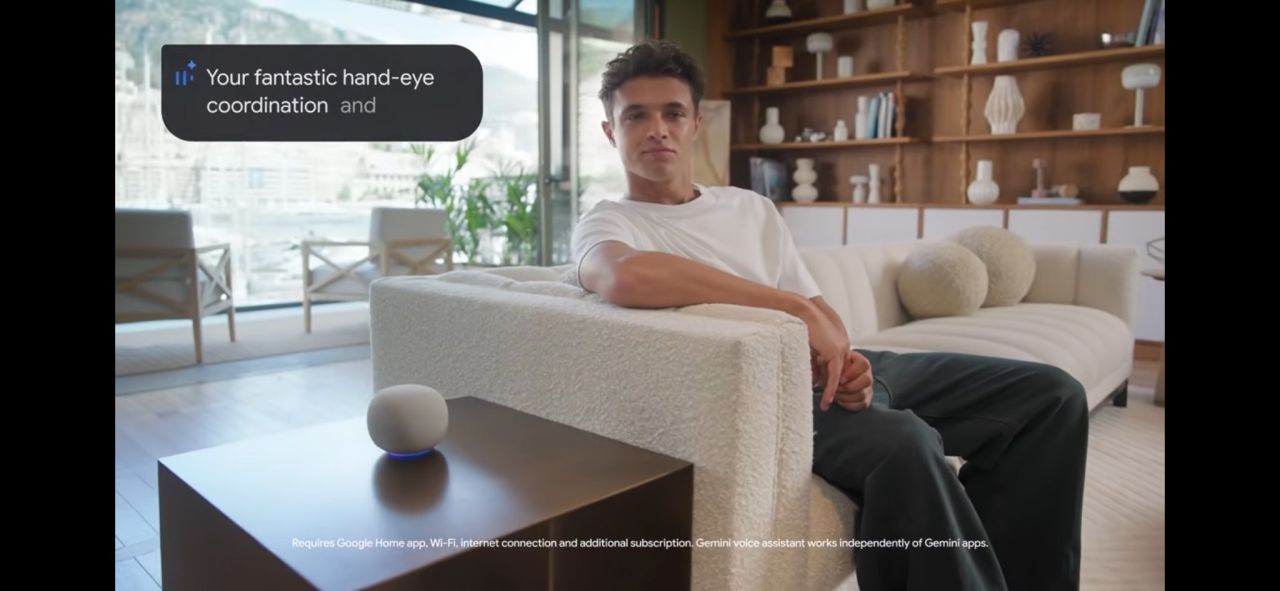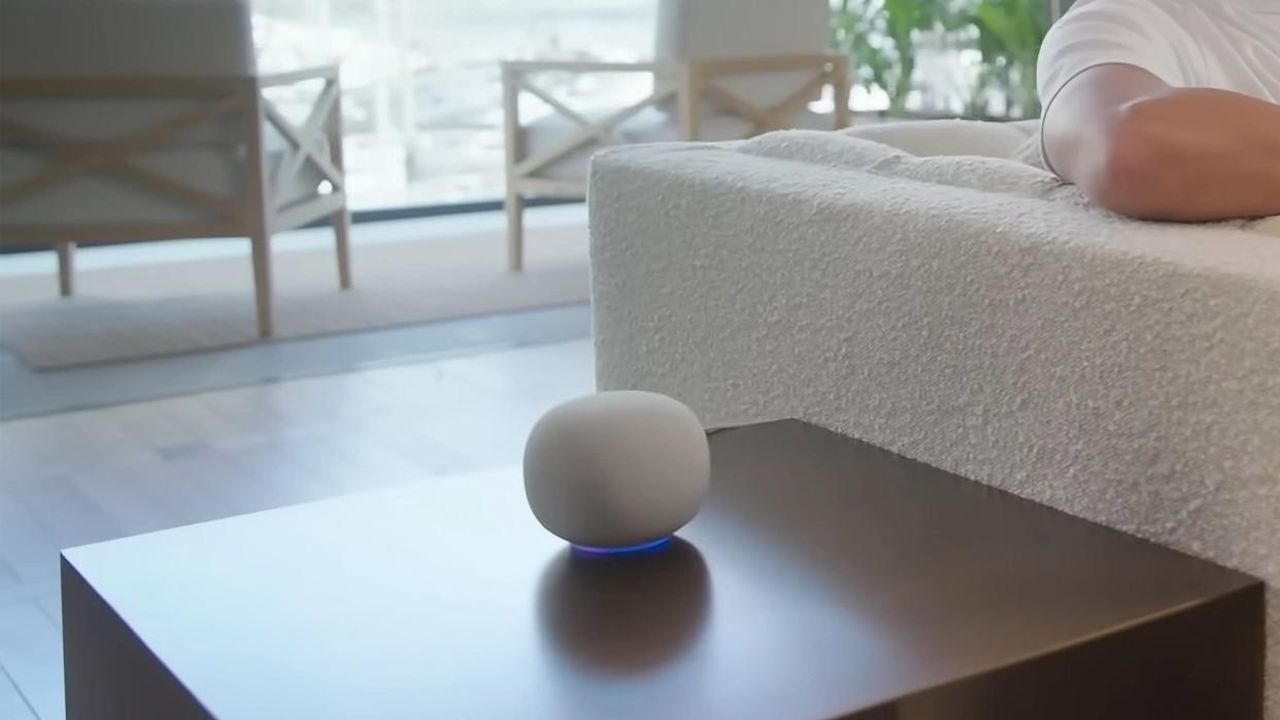A whirlwind of rumours suggests Google is secretly working on a Gemini-powered smart home speaker. It has a sleek, modern design that feels both new and familiar, similar to its competitors, yet still unique. But what’s really getting people’s attention isn’t the look, it’s the technology inside.
It’s surprising that in an era of AI-powered devices, there’s still widespread confusion about what truly defines a smart speaker. Many mistakenly equate the term ‘smart’ with being Bluetooth-compatible. If that were the case, half the bookshelf or desktop speakers we own would qualify as smart. Clearly, that’s not it. The New York Times explains the distinction well in its definition of smart speakers and how they stand apart from standard audio equipment:
“The difference between a smart speaker and a regular bookshelf or portable Bluetooth speaker is that a smart speaker has a microphone that listens for voice commands, as well as a built-in voice assistant that fields your requests.”
To put it simply, Dali, AVID, Marshall, or whatever high-end speakers you own aren’t actually smart unless they can respond to voice commands like, “Hey Siri, play Cowboy of the County by Kenny Rogers” or “Alexa, what is the weather outside?”.
A smart speaker is a device that goes beyond audio playback. It delivers music, podcasts, news, weather updates, audiobooks, and even helps with scheduling, making calls, and shopping lists, all on demand. Traditional speakers? They just play sound. Not to mention, smart speakers also tend to be a linchpin of the smart home, allowing for easier control of devices by voice and consolidation of controls for devices (using one app or by grouping), and they often act as hubs for devices that don’t connect to Wi-Fi.
From what I can recall, Google launched its first smart home speaker in 2016 to compete with Amazon’s Echo, leveraging Google Assistant to provide voice-activated information, control smart home devices, and manage entertainment, similar to how Amazon’s Alexa functions. The introduction of Google Home marked Google’s foray into the smart speaker market, offering a distinct voice assistant powered by Google’s extensive knowledge graph to rival the established Echo and its Alexa Virtual Assistant. But over time, the shine wore off. Google Assistant, while reliable for simple tasks, started to feel dated, especially as competitors like Amazon’s Alexa and Apple’s Siri began flexing their AI muscles.
Another factor that might have provoked Google to act fast is the recent negative reports about Google Assistant being all over the internet. Google’s smart home ecosystem hasn’t exactly been rock-solid lately. In July 2025, Google Home users reported widespread issues, such as the lights wouldn’t turn on, Nest cameras wouldn’t load, and an app that felt borderline unusable. The backlash was so intense that it sparked talk of a class-action lawsuit. Google needed a savior, and Gemini was their samurai.
First spotted by Android Headlines at the Made by Google event last week, the Google Gemini-powered speaker has had everyone’s attention. But let’s start with how this speaker came to light. During Google’s annual Pixel hardware event on August 20, 2025, a pre-recorded video featuring F1 driver Lando Norris showcased a mysterious device. It wasn’t a Nest Mini or a Nest Wifi, it was something new. Sharp-eyed viewers noticed it as a compact, fabric-wrapped speaker with a glowing ring at its base, looking suspiciously like a bulkier Apple HomePod Mini. Android Headlines later confirmed it as a Google Home Speaker, and the internet buzzed with speculation. Later on, Google confirmed (or rather teased) that it is indeed working on something new.

According to media outlets that have gathered information from the video, the design represents a departure from Google’s previous Nest speakers. Android Headlines claims it will be available in four colors: Obsidian (black), Porcelain (white), Jade (light green), and a yet-to-be-named red. From the little glance I had, the speaker appears to be fairly spherical, possibly covered in a soft fabric mesh. As pointed out by Tech Radar, the speaker sports a light ring that glows in Gemini’s signature blue and purple hues when activated.

It’s no secret that Google is phasing out its aging Google Assistant in favor of Gemini for Home, a new AI-powered voice assistant built on advanced language models. I expect them to incorporate the same in the speaker, too. Announced alongside the speaker tease, Gemini for Home promises to handle complex, multi-step commands with ease. For example, I could say, “Hey Google, dim the lights, set the thermostat to 72 degrees, and play some jazz,” and it should execute all three tasks in that particular order of command. That’s a big leap from the traditional Assistant’s occasional stumbles over basic requests like turning off a single light.
The idea of a speaker that can think, reason, and converse more naturally is thrilling, especially for me, who’s grown frustrated with the rigid command structure of older voice assistants. This new speaker isn’t just about answering questions or playing Spotify. It’s designed to be a Matter hub, meaning it can seamlessly control a wide range of smart home devices, from lights to thermostats, regardless of brand.
That’s a big deal for folks who’ve cobbled together a smart home with devices from Philips Hue, Nest, and even some off-brand gadgets. The speaker also reportedly detects unusual sounds, like breaking glass or an alarm, and sends alerts to your phone, acting like a high-tech guard dog. Its ability to pair with a Google TV Streamer for spatial audio sounds great, much like Apple’s HomePods, which can create surround sound with an Apple TV. I’m a bit of a TV nerd, so the idea of a compact speaker delivering immersive audio for my EPL game nights is incredibly appealing. However, I’m curious about the sound quality. Google’s Nest Audio, released in 2020, was praised for its impressive audio at a $100 tag, but it wasn’t perfect in terms of sound. Will this new speaker be any good? Only time will tell.
The highlight of the new speaker will be Gemini Live, a conversational AI mode that lets you have free-flowing chats with the speaker. Given that have become used to conversing with Grok, Chat GPT, and other AI models, this always came as a prerequisite. But here’s the rub: some reports suggest that Gemini Live’s premium features might come with a subscription cost. As someone who already pays for multiple streaming services and is frustrated with the fact that I still have to rent a movie on Amazon Prime despite the subscription, the idea of another monthly fee is not appealing. Google hasn’t clarified what these premium perks will entail or how much they’ll cost, but I hope they’re worth it.

All-in-all, Google’s smart home journey has been a rollercoaster. I remember the excitement of the original Google Home, which felt like a glimpse into the future. But over the years, neglect and inconsistent updates have left users like me annoyed. The Nest Audio and Nest Hub haven’t seen significant refreshes since 2020 and 2021, respectively, and the Google Home app’s recent glitches haven’t helped. With competitors like Amazon rolling out new Echo devices and Apple refining its HomePod lineup, Google’s been lagging.
This new speaker, paired with Gemini for Home, feels like Google’s attempt to reclaim its place in the smart home race. I have no word on the exact release date or its pricing, at the time of writing, but reports suggest a launch before October 2025 is on the cards. Whatever the case, I‘ve been burned by gadgets before, so I am keeping my expectations low. Will Gemini deliver the seamless, intuitive experience Google is hoping for? Or will it be another case of overpromise and underdeliver? Only time will tell. For now, I’ll be keeping a close eye on leaks and announcements to share with you.
Follow Homecrux on Google News!




